
Nov 20, 2019
EU Athletes, as a partner in Integrisport Erasmus+ project, took part in the event in Budapest in order to talk about player unions role and work when it comes to fighting against match-fixing. During the 3-day training organized specially for members of the Hungarian Police, as well as the National Tax and Customs Administration, the Hungarian Prosecution Service and judges of the Hungarian Criminal Court, participants had an opportunity to discuss openly sport manipulation and match fixing and how this phenomenon has been affecting Hungary.
International experts including the Vice Federal Prosecutor of the Belgian Federal Prosecution Service and representatives from the EU Athletes and Global Lottery Monitoring System (GLMS) and from the coordinator of Integrisport Erasmus+, CSCF-Foundation for Sport Integrity. animated the exchange. Their contributions were accompanied by national expertise from the Hungarian Football Federation, the Hungarian Football Player’s Union, the Hungarian Lottery, Szerencsejáték Zrt, the National Bureau of Investigation and the Hungarian Prosecution Service.
The Hungarian Police and CSCF-Foundation for Sport Integrity also informed the participants of the activities of the Hungarian National Platform related to the Council of Europe Convention on Manipulations of Sports Competitions including international co-operation.
As Lt. Colonel Zita Zmolnik, Deputy Director of the National Investigation Bureau, said in her opening speech: “National and international law enforcement and judicial co-operation, and the common thought of relevant public stakeholders and the private sector, are vital in order to successfully fight against this special type of crime phenomenon.” In order to combat sport manipulation, law enforcement and judicial authorities need to be prepared. This is where Integrisport Erasmus+ has an important role: by providing awareness raising to law enforcement agencies, which is crucial to achieve this aim.
Norbert Rubicsek, director of CSCF and Integrisport Erasmus+ project manager added, “Law enforcement agencies and judicial authorities are the primary stakeholders involved in the investigative and court phases of criminal law cases of manipulations of sports competitions. It is therefore extremely important that on the one hand they are well prepared and informed and on the other hand, that other stakeholders fully understand the role of these key stakeholders. Law enforcement and judiciary are the link to completing the chain in a sports manipulation criminal case and are also a vital link in identifying legislation that needs to be in place to effectively combat manipulations of sports competitions.
The Integrisport Erasmus+ awareness raising sessions in each partner country give law enforcement officers and judicial authorities the possibility to better understand and tackle the dangers of sport manipulation to sport and the society. Project partners include Cyprus Police, Finnish Center for Integrity in Sports (FINCIS), Rapid Response and Special Police Force – Hungary, National Tax and Customs Administration – Hungary, Ministry of Security and Justice – the Netherlands, The Department of Physical Education and Sports – Lithuania, Ministry of Justice – Judicial Police – Portugal, Presidium of the Police Force, Ministry of Interior – Slovak Republic, GLMS – The Global Lottery Monitoring System, EU Athletes, Aix-Marseille University – Centre of Sport and the coordinator, Stichting CSCF – Foundation for Sport Integrity and the Council of Europe (CoE) as a supporting organisation. Integrisport is also a partner project of the KCOOS+ project of the CoE.
The next awareness raising session will be held in Vilnius in December 2019.
For more information, please visit:
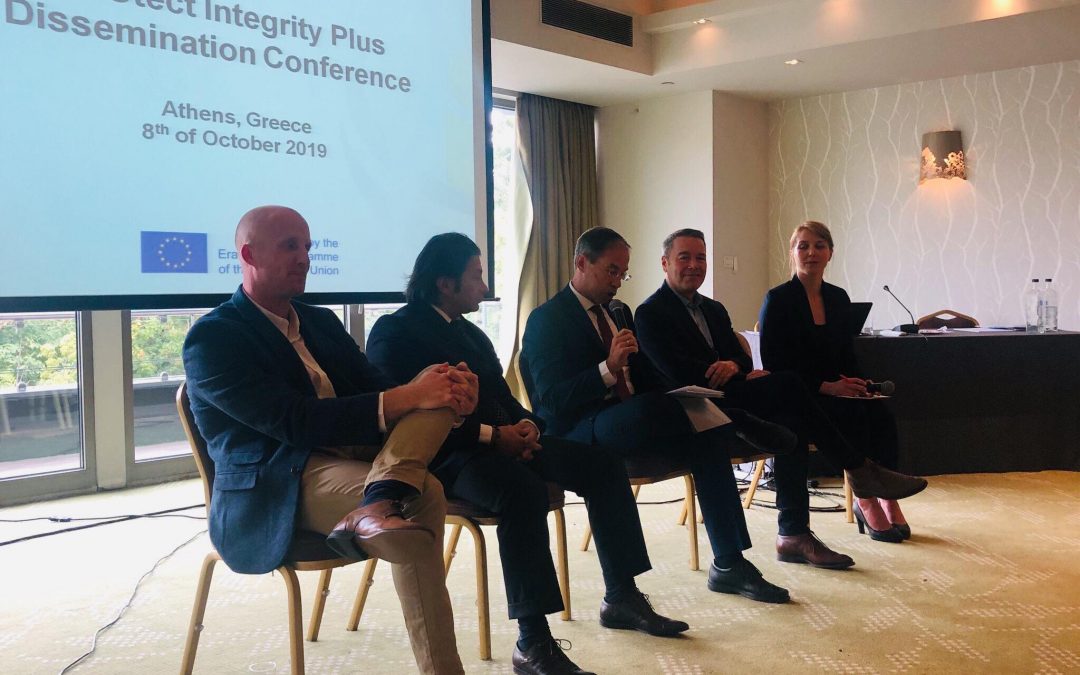
Oct 11, 2019
With our Erasmus+ PROtect Integrity Plus project concluding by the end of the year, a final event has taken place in Athens, Greece on 8th of October to share the results and outputs of the project. The conference was attended by player associations and some of the key stakeholders in the fight against match-fixing which was a great opportunity to discuss the progress and further cooperation needed.

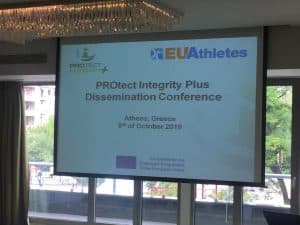
PROtect Integrity is a campaign started back in 2010 in cooperation with betting operators, in order to educate players about the integrity and risks of match fixing. Over the years a number of different projects have taken place under the banner, each project building up on its predecessor. PROtect Integrity Plus specifically aims to implement the Red Button reporting app, initially developed by Finish Football Players Association JPY and FIFPro, in 7 different countries and 5 sports, through the work of 8 player associations cooperating with national stakeholders.

In order to see how the match-fixing can affect the careers and lives of athletes, the participants have he from Samir Arab, Maltese football player banned for 2 years for not reporting an approach and Roy Vermeer from FIFPro who was representing Samir at the appeal case in CAS. The story highlights the need for more education, prevention and focus on governance of sport organizations as the sanction of Samir, considering all elements of the case, was widely regarded as unfair and disproportionate.
 Subsequently, the results of the project so far were presented, including the Red Button app, research led by prof. David Forrest from the University of Liverpool and the grassroots sport video promoted by player associations during the European Week of Sport in order to broaden the reach of the campaign and raise awareness about the match-fixing. Player associations representatives from AJFSF (Spanish futsal), Rugby Players Ireland and PASAP (Greek volleyball) discussed their experiences and views following the implementation of the project. The case study of a fruitful cooperation between the National Platfrom and the player movement in France was also presented.
Subsequently, the results of the project so far were presented, including the Red Button app, research led by prof. David Forrest from the University of Liverpool and the grassroots sport video promoted by player associations during the European Week of Sport in order to broaden the reach of the campaign and raise awareness about the match-fixing. Player associations representatives from AJFSF (Spanish futsal), Rugby Players Ireland and PASAP (Greek volleyball) discussed their experiences and views following the implementation of the project. The case study of a fruitful cooperation between the National Platfrom and the player movement in France was also presented.
The conference concluded with a discussion panel with Matt Fowler (IBIA), Sergio D’Orsi (Europol), George Mavrotas (Greek Government), Mikhael de Thyse (Council of Europe) and Paulina Tomczyk (EU Athletes). The speakers discussed the cooperation between stakeholders in the new environment after the entry into force of the Macolin Convention.
For Paulina Tomczyk, the General Secretary of EU Athletes: ‘I find it really positive and promising for the future that some the main stakeholders in the fight against match-fixing joined the discussion and recognized the essential role that the athletes have to play in this process. We are looking forward to continuing the constructive cooperation with the key actors to protect the integrity of sport’.


Mar 12, 2018
Project partners and staff have gathered in Helsinki, Finland for three days PROtect Integrity Plus Red Button meeting. The project, co-financed by the European Union and the private betting operators ESSA, EGBA and RGA, aims to fight against match-fixing by making sure that the professional and elite players in Europe have a secure and trusted App available to report anything suspicious.
The goal of the meeting was to prepare the seven partner player associations (AJFS, GIBA, HPVPA, HSF, RPA, RPI, PROVALE) to adapt and implement the Red Button app in 7 countries and 5 different sport. EU Athletes works closely with JPY and FIFPro, who have first developed the App, in order to ultimately create a first European-wide player unions-led reporting system across sports.
The project will help improve cooperation with player associations and National Platforms and create new synergies at the European and Global level. Prominent guests and experts, including Tiina Kivisaari (Ministry of Educaton and Culture) Harri Syvasalmi and Jouko Ikonen (Finnish Centre for Integrity in Sports), Martn Rostgaard (Anti-doping Denmark, Danish Natonal Platform), Paolo Bertaccini (Italian Government Office for Sport) have participated in the meeting and shared their achievements and experiences related to fight against match-fixing and dealing with the reports.
The new versions of the App are expected to be ready this summer. Subsequently, partner player associations will provide face-to-face integrity education to more than 3000 professional and elite level players and will introduce the new system to them during team visits.
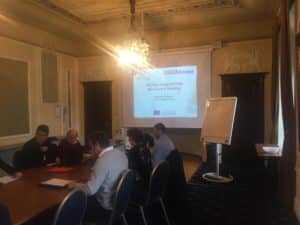
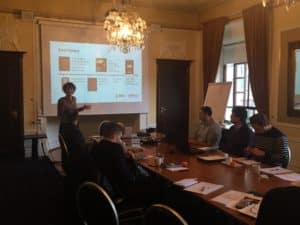
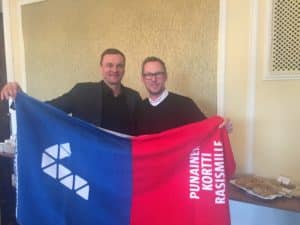
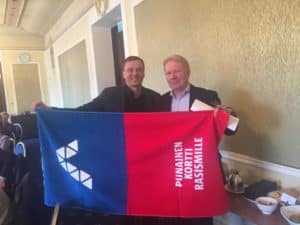
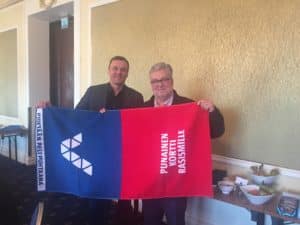


Nov 20, 2017
The staff of our Erasmus+ “2016 PROtect Integrity” project met last week in Amsterdam for the final project meeting. The main goal of the meeting was to review and evaluate the project so far and discuss the remaining actions, including the ongoing research, led by prof. David Forrest and based on responses collected from players’ questionnaires, aiming to evaluate the integrity education delivered by player association during team visits. The paper and other outputs of the project will be published before the end of the year.
Besides project’s main focus on delivering face-to-face integrity education to 15 000 players in Europe, the project has included many other activities and positive developments, such as successful #PROtectIntegrity social media campaign, meetings covering specific issues as well as dialogue and cooperation with essential stakeholders.


Nov 9, 2017
The event organized by the Greek MEP Stelios Kouloglou has taken place in the European Parliament in Brussels on the 7th of November. The conference has gathered many interesting speakers including representatives from the European institutions, as well as the research and sport, in order to discuss the problem of corruption, match-fixing and doping. Our Policy Officer Paulina Tomczyk has taken part in the panel and had an opportunity to highligh the importance of good governance in sport, the role of athletes in reaching this goal and the issues related to the specificity and autonomy of sport in this context.





 Subsequently, the results of the project so far were presented, including the Red Button app, research led by prof. David Forrest from the University of Liverpool and the
Subsequently, the results of the project so far were presented, including the Red Button app, research led by prof. David Forrest from the University of Liverpool and the 









